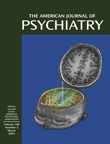Dr. Kirkpatrick and Colleagues Reply
To the Editor
We appreciate the interest of Dr. Bottlender and colleagues in our recent article. They cite three published studies that, in their view, fail to replicate the association between deficit schizophrenia and summer birth (Dollfus et al. 1999; Rodrigo et al. 1991; Bottlender and Möller, 2000). However, there are several issues that undermine the value of these studies as either refutations or confirmations of the previous findings. The first is that these studies did not use population-based samples and, therefore, are not appropriate for epidemiological research. Moreover, in two of these studies (Rodrigo et al. and Bottlender and Möller), the investigators did not attempt to distinguish deficit and nondeficit groups, as the aims of the studies were quite different. One study (Rodrigo et al.) compared patients born between December 1 and March 31 to those born between April 1 and November 30; these dates are not relevant to a replication of the summer birth effect.
Dr. Bottlender and colleagues also present a new analysis in their letter; the data appear to come from an extension of a previous study (Bottlender and Möller, 2000; Bottlender et al., Eur Psychiatry, in press). Unfortunately, this analysis does not provide more information on the summer birth effect. First, the study group does not appear to be population based (Bottlender and Möller, 2000), so it is not appropriate for discussion of this epidemiological issue. Second, their statement that “it can be assumed that most patients with a residual type of schizophrenia…would also fulfill the criteria for a deficit syndrome” (Bottlender and Möller) is puzzling, as their own data demonstrate that such is not the case. When they state that “50% of the patients had a deficit syndrome according to the criteria proposed by Dr. Kirkpatrick et al.,” it is not clear whether they are referring to use of the Schedule for the Deficit Syndrome (1) or the Proxy for the Deficit Syndrome (2). In either case, the 50% prevalence of deficit schizophrenia makes it clear that their deficit and nondeficit groups did not resemble those in previous studies of deficit schizophrenia and summer birth, as the prevalence of the deficit group is about 20%–25% among study groups with chronic schizophrenia and 15%–20% in first-episode, population-based samples (3, unpublished report by E. Messias et al.). As a consequence, there are many false positive diagnoses of deficit schizophrenia in their study. There may be many false negative diagnoses as well, but the information needed to make that judgment is not available to us, as we were not provided with clinical and demographic comparisons of the deficit and nondeficit groups. The appropriate use of the Proxy for the Deficit Syndrome, and especially validity testing for groups defined by it, have been described previously (2, 4–8, unpublished report by Messias et al.).
The Proxy for the Deficit Syndrome is a special case of the more general issue of intergroup reliability for the deficit/nondeficit categorization (9). Dr. Bottlender and colleagues are certainly correct in their view that it would be desirable for other research groups to investigate the summer birth risk factor. However, without population-based samples and deficit and nondeficit groups that are similar to those in the published studies, it will not be possible to refute or confirm the existence of the summer birth risk factor.
1. Kirkpatrick B, Buchanan RW, McKenney PD, Alphs LD, Carpenter WT Jr: The Schedule for the Deficit Syndrome: an instrument for research in schizophrenia. Psychiatry Res 1989; 30:119-123Crossref, Medline, Google Scholar
2. Kirkpatrick B, Buchanan RW, Breier A, Carpenter WT Jr: Case identification and stability of the deficit syndrome of schizophrenia. Psychiatry Res 1993; 47:47-56Crossref, Medline, Google Scholar
3. Kirkpatrick B, Ross DE, Walsh D, Karkowski L, Kendler KS: Family characteristics of deficit and nondeficit schizophrenia in the Roscommon Family Study. Schizophr Res 2000; 45:57-64Crossref, Medline, Google Scholar
4. Kirkpatrick B, Ram R, Amador XF, Buchanan RW, McGlashan T, Tohen M, Bromet E: Summer birth and the deficit syndrome of schizophrenia. Am J Psychiatry 1998; 155:1221-1226Link, Google Scholar
5. Kirkpatrick B, Castle D, Murray RM, Carpenter WT Jr: Risk factors for the deficit syndrome of schizophrenia. Schizophr Bull 2000; 26:233-242Crossref, Medline, Google Scholar
6. Messias E, Kirkpatrick B: Summer birth and deficit schizophrenia in the Epidemiological Catchment Area study. J Nerv Ment Dis 2001; 189:608-612Crossref, Medline, Google Scholar
7. Tek C, Kirkpatrick B, Kelly C, McCreadie RG: Summer birth and deficit schizophrenia in Nithsdale, Scotland. J Nerv Ment Dis 2001; 189:613-617Crossref, Medline, Google Scholar
8. Kirkpatrick B, Herrera Castanedo S, Vazquez-Barquero JL: Summer birth and deficit schizophrenia: Cantabria, Spain. J Nerv Ment Dis 2002; 190:526-532Crossref, Medline, Google Scholar
9. Kirkpatrick B, Buchanan RW, Ross DE, Carpenter WT Jr: A separate disease within the syndrome of schizophrenia. Arch Gen Psychiatry 2001; 58:165-171Crossref, Medline, Google Scholar



